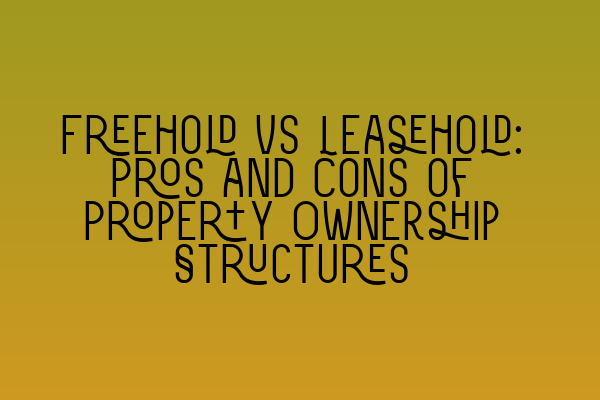Freehold vs Leasehold: Pros and Cons of Property Ownership Structures
When it comes to buying a property, there are two main ownership structures to consider: freehold and leasehold. Each structure has its own set of pros and cons, and understanding these differences is crucial in making an informed decision. In this blog post, we will explore the pros and cons of both freehold and leasehold ownership, helping you to navigate the property market with confidence.
But first, let’s define what freehold and leasehold mean.
A freehold property means that you own both the property and the land on which it stands, giving you full ownership rights. You have complete control and responsibility for the property, allowing you to make decisions without consulting anyone else. On the other hand, a leasehold property means that you only own the property for a specified period, as you essentially become a tenant of the landowner. The land is leased to you for a fixed term, which can range from decades to hundreds of years, but the ultimate ownership remains with the landowner.
Now that we understand the basic concepts, let’s explore the pros and cons of each ownership structure.
Pros of Freehold Ownership:
1. Full Control: With freehold ownership, you have the freedom to modify and extend your property as you see fit. You are not restricted by any lease conditions or the need to seek permission from a landlord.
2. Investment Potential: Freehold properties tend to hold their value better than leasehold properties. They are seen as a more attractive investment option, as they often appreciate over time and can be easier to sell.
3. No Ground Rent or Service Charges: Unlike leasehold properties, freehold properties do not require the payment of ground rent or service charges. This means you have more control over your finances and don’t have to worry about additional costs.
Cons of Freehold Ownership:
1. Full Responsibility: While having full control can be a pro, it also means that you are solely responsible for all repairs and maintenance. This includes the cost of any structural repairs or maintenance work needed.
2. Potential Disputes: As a freeholder, you may have to deal with disputes with neighbors over boundaries or rights of access. Resolving such disputes can be time-consuming and costly.
3. Higher Purchase Price: Freehold properties typically come with a higher purchase price compared to leasehold properties. This can make it more challenging for first-time buyers to enter the housing market.
Pros of Leasehold Ownership:
1. Affordable Entry Point: Leasehold properties often have a lower initial purchase price, making them more accessible for first-time buyers or those on a limited budget.
2. Maintenance Responsibility: Unlike freehold ownership, leasehold properties often come with the benefit of having the responsibility of maintenance and repairs shared with other leaseholders. This can reduce the financial burden on individual owners.
3. Amenities and Services: In some cases, leasehold properties come with added amenities and services such as communal gardens, parking areas, or security systems. These can enhance your living experience.
Cons of Leasehold Ownership:
1. Lease Length and Renewal: The fixed term of a leasehold property can be a disadvantage, especially if the remaining lease term is short. Renewing a lease can be a complex and costly process, and there is no guarantee that the landlord will agree to renew.
2. Ground Rent and Service Charges: Leasehold properties often require the payment of ground rent and service charges, which can increase over time. These additional costs can impact your overall budget and financial planning.
3. Limited Control: As a leaseholder, you are subject to the terms and conditions of the lease. This means you may have restrictions on making alterations or improvements to the property, and you may need to seek permission from the landlord for certain changes.
In conclusion, both freehold and leasehold ownership structures have their own advantages and disadvantages. It ultimately depends on your personal circumstances, financial situation, and long-term plans for the property. It is vital to carefully consider these factors before making a decision.
If you need further guidance or want to explore the legal aspects of property ownership, check out the related articles below:
– Understanding Contractual Capacity: Rights and Limitations
– Interactive SQE Mock Tests for Contract Law: Test Your Knowledge
– Join Our SQE Contract Law Webinars: Expert Insights and Guidance
– Contract Law Reforms: An Analysis of Recent Changes
– Parties in a Contract: Rights and Responsibilities
At SQE Property Law & Land Law, our team of expert solicitors can provide you with comprehensive advice and assistance in navigating the complexities of property ownership. Contact us today to discuss your needs and receive personalized support.
